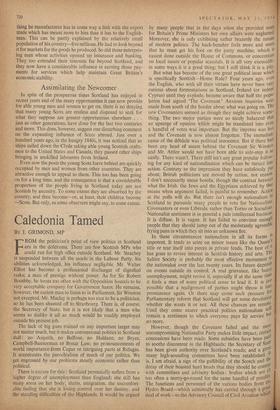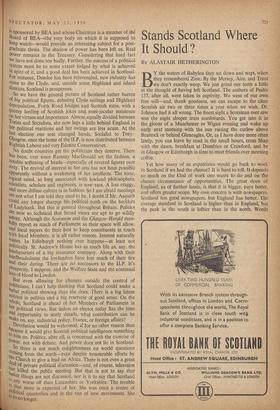Caledonia Tamed
BY J. GRIMOND. MP FROM the politician's point of view politics in Scotland are in the doldrums. There are few Scottish MPs who licould run for high office outside Scotland. Mr. Strachey is suspended between all the stools in the Labour Party, his abilities acknowledged, his influence negligible. Mr. Walter Elliot has become a professional discharger of dignified tasks; a man of prestige without power. As for Sir Robert I3oothby, he. hunts too often with the Opposition hounds to be very acceptable company for Government hares. He remains. however, the easiest man to listen to in Parliament, Sir Winston not excepted. Mr. Maclay is perhaps too nice to be a politician. so he has been shunted off to Strasbourg. There is, of course, the Secretary of State. but it is not likely that a man who seems to dislike it all so much would be readily employed outside his present job.
The lack of big guns trained on any important target may not matter much, but it makes conventional politics in Scotland dull : no Asquith, no Balfour, no Haldane, no Bryce, Campbell-Bannerman or Bonar Law; no pronouncements of world importance from Cupar or intriguing pacts at Relugas. It accentuates the parochialism of much of our politics. We get engrossed by our problems mostly economic rather than political.
There is excuse for this : Scotland perennially suffers from a higher degree of unemployment than England; she still has many sores on her body; slums, emigration, the uncomfort- able feeling that she is losing control over her destiny, and the standing difficulties of the Highlands. It would be argued for Britain's Prime Ministers her own affairs were neglected. by many people that in the days when she provided seats Moreover, she is only exhibiting rather brazenly the nature of modern politics. The back-bencher feels more and note that he must get his foot on the party machine, which is easiest done outside the House of Commons, or concentrate on local issues or popular scandals. It is all very excusable; in some ways.it is a good thing; but I still think it is a pity. But what has become of the one great political issue which is specifically Scottish—Home Rule? Four years ago, even the English, who with all their virtues have never been yen)) curious about fermentations in Scotland, Ireland (or indeed Cyprus) until they explode, became aware that half the popu. lation had signed 'The Covenant.' Anxious inquiries were made from south of the border about what was going on. Tile new Covenanters seemed as though they might achieve seine. thing. The two major parties were so nicely balanced that an upsurge of opinion which might be translated into ( yea a handful of votes was important. But the impetus was lost and the Covenant is now almost forgotten. The immediate cause of the debacle was political innocence. But if there had been any head of steam behind the Covenant Sir Winstoil and Mr. Attlee would not have been able to side-step it easily. There wasn't. There still isn't any great popular follow' ing for any kind of nationalisation which can be turned int(' action. Contrary to the impression they have sedulously phi about, British politicians are moved by action, not reason. I don't necessarily mean bombs, though the contrast betweeli what the Irish. the Jews and the Egyptians achieved by hnl means when argument failed, is painful to remember. Ac inn at the polls will do. But there isn't enough nationalism Scotland to persuade many people to vote for Nationalists Covenanters or even Liberals, rather than Tories or Socialist Nationalist sentiment is in general a pale intellectual business. It is diffuse. It is vague. It has failed to convince enough people that they should jump out of the moderately agree; bic frying pans in which they sit into an unknown fire.
In these circumstances nationalism in all its form! impotent. It tends to seize on minor issues like the Queen's title or tear itself into pieces in private feuds. The best Of it has gone to revive interest in Scottish history and arts. Thc Saltire Society is probably the most effective monument 1° the nationalist over the last twenty years. Its future depend' on events outside its control. A real grievance, like he,i`. unemployment, might revive it. especially if at the same tihl it finds a man of some political sense to lead it. It is J°I possible that a realignment of parties might throw it int° prominence again. Or there may come such pressure for Parliamentary reform that Scotland will get some devolution whether she wants it or not. All these chances are rernniel Until they come nearer practical politics nationalism will remain a sentiment to which everyone pays lip service bel no more. ore However, though the Covenant failed and the 111 aio uncompromising Nationalist Party makes little impact, cert aid concessions have been made. Some subsidies have been p ate to soothe discontent in the Highlands; the Secretary of SI cat has been given authority over Scotland's roads; and a V It many high-sounding committees have been established. the is. I am afraid, a sign of the gullibility of the Scotch and Cal decay of their boasted hard heads that they should be cont all with committees and advisory bodies : bodies which are itS' too often a merry-go-round for the same handful of pund I lie The functions and personnel of the various bodies from Hydro Board—which admittedly has carried through a ere'ill deal of work—to the Advisory Council of Civil Aviation wine° is sponsored by BEA and whose Chairman is a member of the Board of BEA—the very body on which it is supposed to keep watch—would provide an interesting subject for a post- graduate thesis. The shadow of power has been left us. Real Power remains in the Treasury. Considering that hard fact We have not done too badly. Further, the success of a political sYstem must be to some extent judged by what is achieved in spite of it, and a good deal has been achieved in Scotland. For instance, Dundee has been rejuvenated, new industry has come to the Clyde. and, outside some Highland and island districts, Scotland is prosperous.
So we have the general picture of Scotland rather barren of big political figures, debating Clyde sailings and Highland depopulation, Forth Road bridges and Scottish rates, with a queezy larding of Scottish jokes and semi-jocular insistence on her virtues and importance. Almost equally divided between Tories and Socialists, she now lags a little behind England in her political reactions and her swings are less acute. At the last election one seat changed, hands, Socialist to Tory : Glasgow, once the home of the ILP, is now distributed between kightish Labour and very Edenite Conservatives. No doubt countries get the politicians they deserve. There has been, ever since Ramsay MacDonald set the fashion, a notable softening of heads—especially of revered figures over sixty. The reyival of interest in her arts has not been possible apparently without a weakening of her intellects. The terse, logical mind, so long associated with lowland philosophers, scientists, scholars and engineers, is now rare. A less craggy, and more diffuse culture is in fashion. So I am afraid meetings are not what I am told they used to be. I doubt if Mr. Asquith could any longer sharpcn his political teeth on the hecklers of Ladybank. But this is general throughout Britain. Politics are now so technical that broad views are apt to go wildly astray. Although the Scotsman and the Glasgow Herald man- fullY report as much of Parliament as their space will allow, and local papers do their best to keep constituents in touch With local Members, it is all rather remote. Interest naturally Wanes. In Edinburgh nothing ever happens—at least not Politically. St. Andrew's House has as much life as, say, the headquarters of a big insurance company. Along with their hardheadedness the lowlandcrs have lost much of their fire and their daring. There are no successors to the ILP. It's Prosperity, I suppose, and the Welfare State and the continual 10as of blood to London. nut even allowing for changes outside the control of politicians. I can't help thinking that Scotland could make a ,I)otter political showing than she does. There is a big latent interest in politics and a big reservoir of good sense. On the ;411ole. Scotland is ahead of her Members of Parliament in net political views. But unless an elector today has the time _and opportunity to study details, what contribution can he make on, say, industrial policy. France, or foreign affairs? j_ Devolution would be welcomed, if for no other reason than ,°enause it would give Scottish political intelligence something to bite on. Politics, after all, is concerned with the exercise of Pewer, not with debate. And power does not lie in Scotland. c So there is not much enlighrenment on world questions v?roing from the north—even despite honourable efforts by 41e Church to give a lead on Africa. There is not even a great Leal of private political discussion—and, of course, television as killed the public meeting. But that is not to say that isetter things are not discussed, nor is it to say that Scotland ;, atlY worse off than Lancashire or Yorkshire. The trouble '' that more is expected of her. She was once a centre of quarterlies and in the van of new movements. She So no longer.











































 Previous page
Previous page